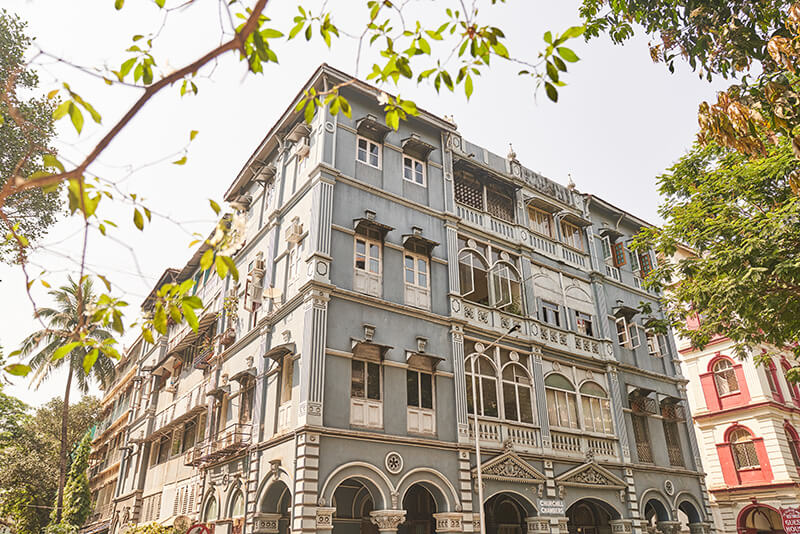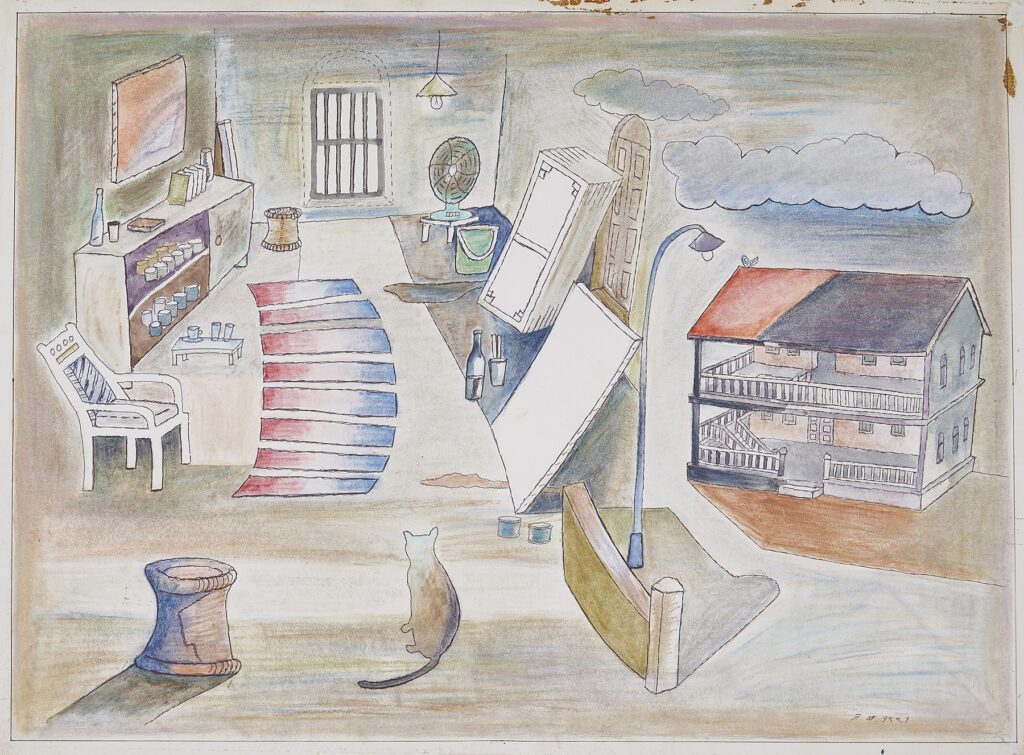
About The Exhibition
Artist: Prabhakar Barwe
Exhibition Dates: 9th May – 1st June, 2024
Not long after graduating from the JJ School of art in 1959, Prabhakar Barwe took a designer’s job at the Weavers’ Service Centre, an organisation founded by Pupul Jayakar in Madras in the 1950s with the aim of bringing contemporary sensibilities to traditional crafts. By the 1960s, WSC had branches in a number of major cities, and Barwe was initially posted to Varanasi. The city’s traditions of faith deeply influenced his artistic practice even as he set about drawing patterns for local artisans to copy on fabric. The earliest painting in the present exhibition is a watercolour from Barwe’s ‘Tantric’ period. It employs some geometric patterns akin to his work as a designer, but overlays these with symbolic figuration. Specifically, it represents the ‘World Turtle’ or Vishnu’s Kurma avatar, and a bright sun against a background of mauve bands.

The artist gained a transfer to the Bombay outpost of the Weavers’ Service Centre and the bulk of the drawings and watercolours in the show are designs created in his adopted hometown in the 1970s. The fact that we have such well-preserved examples of his professional practice is a sign that he and his admirers considered the pieces to have significance beyond the immediately utilitarian. Finally, we have three paintings created in the 1990s, not long before his untimely death in 1995. Two of these are characteristic of the style that has come to be recognized as inimitably his own. Created in mellow shades, the paintings gesture towards landscapes within which are placed objects out of proportion to their natural scale, evoking uncanny, dreamlike associations in viewers. These are paintings of an artist who has absorbed the lessons of abstraction, surrealism, Indian miniature painting traditions and of European masters like Paul Klee without being beholden to any of them.
The last painting is a relatively realistic depiction of an artist’s studio and of a building in which the studio is presumably housed. The modesty of the arrangement creates a mood of contentment, suggesting this is all an artist needs to be happy. Barwe himself adhered to a philosophy of simple living, one from which the art world has moved a great distance in the years since his death, heightening the sense of nostalgia contained in the painting.

About The Gallery
Akara blends the rich traditions of modern art with the innovations of contemporary practice. Nestled in the art district of Mumbai, Akara operates across two spaces: Akara Modern, one of the leading modern art galleries in India since 2015, and Akara Contemporary, a new platform for the current and next generation of South Asian and international artists. Across both galleries, Akara centres India and South Asia within the continuum of international art history and brings alternative narratives and realities to the foreground of global discourse. Through exhibition programming, artist representation, institutional partnerships, art fairs, gallery collaborations, and art advisory, from which it first was established in 2009, Akara aspires to transcend borders in its many forms, from the artistic to the geographic.

About the Artist

Prabhakar Barwe was born in Nagaon, Maharashtra, and graduated from the Sir J. J. School of Art, Mumbai, in 1959. During his stay in Varanasi, the holy city of India, between 1961 and 1965, he came into contact with the canon of Tantra (mysticism) that markedly influenced his work. Known as a symbolist and an abstractionist, Barwe’s multitudinous influences can be traced through the steady evolution of his works. His poetic sensibility combined with his representations of ordinary objects echoed the emotional and mystical associations he wanted to render into his works. The empty space and the use of dedicated minimalistic designs set apart Barwe’s works from his contemporaries. As a painter, he won an award instituted by the Japanese newspaper Yoshihari Shimbun. In 1976, he won an award at the annual exhibition of the Lalit Kala Akademi and in 1969, he was awarded the Yomiuri Shimbun Award from Japan. Barwe had his works exhibited in several shows including one at Wisconsin, U.S., in 1963; Indian Painters, Zurich, 1970; Grey Art Gallery, New York in 1975; International Biennale, Menton, France, 1976; Modern Indian Painting, Hirshhorn Museum, Washington in 1983 and more. Towards the end of his life, he wrote a book in Marathi called Kora Canvas (Blank Canvas), documenting his feelings, expressions, struggles, and satisfaction as an artist
AKARA MODERN
4/5 Churchill Chambers, 1st Floor
32 Mereweather Road
Colaba, Mumbai 400001
CONTACT
: +91 72084 88979
: modern@akaraart.com
TIMINGS
11:00 a.m. to 6:30 p.m.
Tuesday – Saturday
Closed on Public Holidays
Art Blogazine 2024

No comments:
Post a Comment
Thanks for comment JK